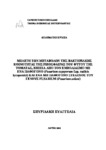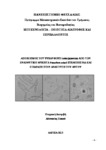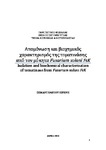A Fusarium solani endophyte vs fungicides: Compatibility in a Fusarium oxysporum f.sp. radicis-lycopersici – tomato pathosystem
Date
2018Language
en
Sujet
Résumé
The potential of FsK, a non-pathogenic endophytic Fusarium solani strain, to be utilized as a biocontrol agent in combination with nine selected fungicides registered in tomato crops in Greece was evaluated. In vitro fungitoxicity tests revealed that FsK was insensitive to doses exceeding 100 μg/mL of thiophanate-methyl, fenhexamid, cyprodinil, boscalid and mancozeb. On the contrary, prochloraz, fludioxonil, pyraclostrobin and difenoconazole were most toxic to FsK. None of the later fungicides affected conidial production in an adverse way. Drenching of tomato plants with the above fungicides at recommended doses did not significantly affect colonization of tomato roots by FsK as revealed by in vitro isolation and Real Time PCR quantification. The disease suppressive ability of FsK against Fusarium oxysporum f.sp.radicis lycopersici (FORL) was not adversely affected by the post-inoculation application of commercial formulations of fludioxonil (Switch) and pyraclostrobin (Comet) at the recommended doses. Even more, the Comet–FsK combination resulted in enhanced disease suppression compared to either of the two treatments applied individually. In conclusion, not only biocontrol agent FsK is suitable for use in tomato integrated disease management programs that include all tested fungicides but also, some FsK –fungicide combinations can have additive effect against FORL disease incidence. © 2018 British Mycological Society
Collections
Related items
Showing items related by title, author, creator and subject.
-
Απομόνωση και βιοχημικός χαρακτηρισμός της τοματινάσης από τον μύκητα Fusarium solani Fsk
Ξεμαντήλωτου, Ειρήνη (2013)


